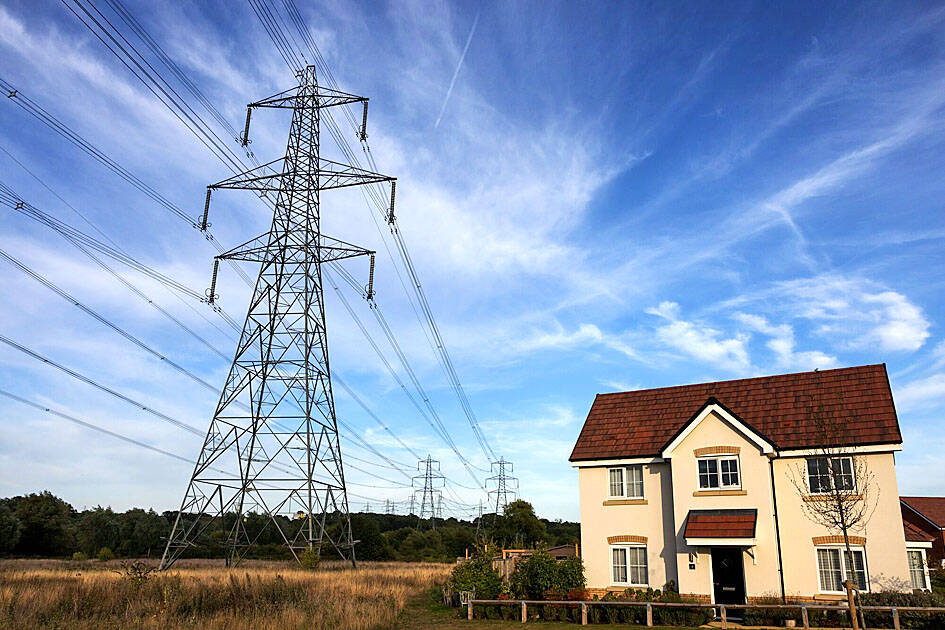Microsoft Corp and OpenAI are among the US firms that have in the past few days pledged to invest £31 billion (US$41.8 billion) into artificial intelligence (AI) projects in the UK, but industry experts say the commitment could be undermined by the state’s aging power grid and some of the world’s highest electricity prices.
British Prime Minister Keir Starmer has promised to fast-track planning approval for data centers and ease access to the power grid, but AI is notoriously energy-hungry and companies could look elsewhere if the government cannot meet its commitments.
“The UK is simply unfit for datacenter development, with some of the world’s highest electricity prices, an ill-suited planning system and a systemic failure of governance,” XTX Markets Ltd chief technology officer Joshua Leahy said.

Photo: Bloomberg
Earlier this year, XTX Markets, the quant trading firm backed by billionaire Alex Gerko, announced it would spend more than £1 billion building five data centers in Finland, where power is cheaper, to underpin its growing use of machine learning.
The US-UK initiative is a spin off from US President Donald Trump’s visit to the UK last week.
Getting these plans off the page and onto the ground is going to be tough. New infrastructure in the UK from hospitals to manufacturing is already facing challenges from an aging, strained grid. As things stand, it can take at least five years to get a new connection, according to real-estate firm Savills PLC, which works with developers to identify which sites are suitable for data centers.
The UK is making progress toward its 2030 goal, getting a record 50 percent of its electricity supply from renewables last year, government data showed.
Even with renewable power being added at a record pace, demand from data centers could grow 40 percent by 2030, which would quickly soak up the extra supplies, analysis firm ICIS said.
The UK has high electricity costs because of the role gas-fired power plants play in setting prices. The most expensive megawatt needed to meet demand sets the price for everyone in the market. That means that even if the wind is blowing and the sun shining, a small amount of expensive gas on the grid can drive up the cost. In other parts of Europe, such as France, cheaper sources like nuclear energy keeps prices lower.
Countries such as France where power prices are cheaper are more attractive than the UK and that would start to take effect by 2030, ICIS said.
“The price differential is currently the main distinction between the French and UK markets in terms of data-center attractiveness,” ICIS analyst Luca Urbanucci said. “High UK electricity costs are likely to remain a structural drag, as data-center developers increasingly gravitate toward regions with lower power prices and abundant renewable resources.”

SEMICONDUCTORS: The German laser and plasma generator company will expand its local services as its specialized offerings support Taiwan’s semiconductor industries Trumpf SE + Co KG, a global leader in supplying laser technology and plasma generators used in chip production, is expanding its investments in Taiwan in an effort to deeply integrate into the global semiconductor supply chain in the pursuit of growth. The company, headquartered in Ditzingen, Germany, has invested significantly in a newly inaugurated regional technical center for plasma generators in Taoyuan, its latest expansion in Taiwan after being engaged in various industries for more than 25 years. The center, the first of its kind Trumpf built outside Germany, aims to serve customers from Taiwan, Japan, Southeast Asia and South Korea,

POWERING UP: PSUs for AI servers made up about 50% of Delta’s total server PSU revenue during the first three quarters of last year, the company said Power supply and electronic components maker Delta Electronics Inc (台達電) reported record-high revenue of NT$161.61 billion (US$5.11 billion) for last quarter and said it remains positive about this quarter. Last quarter’s figure was up 7.6 percent from the previous quarter and 41.51 percent higher than a year earlier, and largely in line with Yuanta Securities Investment Consulting Co’s (元大投顧) forecast of NT$160 billion. Delta’s annual revenue last year rose 31.76 percent year-on-year to NT$554.89 billion, also a record high for the company. Its strong performance reflected continued demand for high-performance power solutions and advanced liquid-cooling products used in artificial intelligence (AI) data centers,

Gasoline and diesel prices at domestic fuel stations are to fall NT$0.2 per liter this week, down for a second consecutive week, CPC Corp, Taiwan (台灣中油) and Formosa Petrochemical Corp (台塑石化) announced yesterday. Effective today, gasoline prices at CPC and Formosa stations are to drop to NT$26.4, NT$27.9 and NT$29.9 per liter for 92, 95 and 98-octane unleaded gasoline respectively, the companies said in separate statements. The price of premium diesel is to fall to NT$24.8 per liter at CPC stations and NT$24.6 at Formosa pumps, they said. The price adjustments came even as international crude oil prices rose last week, as traders

SIZE MATTERS: TSMC started phasing out 8-inch wafer production last year, while Samsung is more aggressively retiring 8-inch capacity, TrendForce said Chipmakers are expected to raise prices of 8-inch wafers by up to 20 percent this year on concern over supply constraints as major contract chipmakers Taiwan Semiconductor Manufacturing Co (TSMC, 台積電) and Samsung Electronics Co gradually retire less advanced wafer capacity, TrendForce Corp (集邦科技) said yesterday. It is the first significant across-the-board price hike since a global semiconductor correction in 2023, the Taipei-based market researcher said in a report. Global 8-inch wafer capacity slid 0.3 percent year-on-year last year, although 8-inch wafer prices still hovered at relatively stable levels throughout the year, TrendForce said. The downward trend is expected to continue this year,